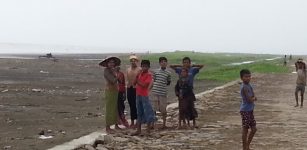Untold Current Atrocities: Myanmar’s Persecution of the Rohingya

As Myanmar’s security forces begin arming Rakhine Buddhist civilians in the northern state of Rakhine, local Rohingya Muslims are set to face new waves of persecution.
Last week, Rakhine police chief Colonel Sein Lwin said his force was recruiting a new regional police to counter an alleged threat from the stateless Rohingya minority.
This comes as the military carries out a month long counterinsurgency operation in Maungdaw township: a region in the northwest of the state, where 90 percent of the population are Rohingya.
The Myanmar armed forces, officially known as the Tatmadaw, declared the region an “operation zone” in early October, when they commenced sweeps of the area. Thirty three Rohingyas have been killed during the conflict, along with five soldiers.
But the numbers of locals affected is much higher. Fifteen thousand Rohingyas have been displaced, while three thousand of the state’s majority Rakhine population have fled their homes.
Unknown insurgents trigger the crackdown
The military began their month long reprisals in response to three attacks on police posts along the Bangladesh border on October 9. Nine officers were killed by the attackers, who made off with dozens of weapons and thousands of rounds of ammunition.
The President’s office attributed the attacks to a previously unknown Rohingya group called Aqa Mul Mujahidin. The militant group is said to have 400 members. However, Myanmar state counsellor, Aung San Suu Kyi, urged caution over the certainty of the claim.
Since the military clamped down on Maungdaw township, all aid agencies, humanitarian rights groups and journalists have been denied access into the area. The local population have had a curfew imposed upon them and there is a ban on gatherings of five or more people.
But news of the atrocities faced by the Rohingya population at the hands of security forces has filtered out. Extrajudicial killings have taken place. Soldiers have raped dozens of women and entire villages have been burned to the ground.
A voice from inside
Rohingya rights activist Aung Win lives in the state capital of Sittwe – in a section of the city called Aung Mingalar. This Muslim quarter – home to an estimated 4,000 Rohingya – effectively functions as a prison: it’s fenced off, the entrances are guarded by police, and the inhabitants are not allowed to leave.
Aung Win told Sydney Criminal Lawyers® over the phone that the government is carrying out “arbitrary arrests and unlawful killings of the Rohingya people and burning down houses without any reason,” in Maungdaw.
However, the government has denied its troops have carried out any abuses during the state’s most brutal intercommunal violence in four years.
A society torn
Sectarian riots broke out in June 2012, as extreme factions of the Rakhine Buddhist population began violently attacking and burning down Rohingya villages throughout the state. The attacks were instigated by the alleged rape of a Buddhist woman by three Muslim men in Kyaukphyu township.
A more coordinated set of attacks were undertaken against Rohingya villages in nine townships in October that year. Government soldiers and local authorities are reported to have either stood by or participated in the attacks.
Internally displaced
The attacks drove an estimate 120,000 Rohingya people into internally displaced person (IDP) camps, the majority of which run along the coast of the Bay of Bengal just west of the capital. The official death toll of the 2012 riots was around 100 people.
According to Aung Win, after the October 9 attacks, security forces in Sittwe have been entering the IDP camps after dark, fighting with the people and arresting them. “The army attacked and beat the Rohingya people there,” he said, adding that six people were badly injured.
Lost at sea
Between January and March last year, around 25,000 Rohingyas fled the country in boats. A large number of them were from the IDP camps.
The humanitarian crisis caught world attention in May, as thousands of Rohingya were stranded on the Andaman Sea in rickety boats, while the Thai, Malaysian and Indonesian governments refused to accept the asylum seekers.
Later that month, Malaysia and Indonesia announced they would accept the refugees, as long as they were repatriated or resettled within a year.
Stateless in their own country
There are around 1.3 million Rohingyas living in Rakhine, which is about a third of the state’s population.
The Myanmar government recognises 135 national ethnic groups within its borders, but the Rohingyas are not one of them. They’re referred to as Bengalis and classed as illegal immigrants from Bangladesh. This effectively denies the Rohingya their own separate ethnic identity.
The 1982 Citizenship Law only allows citizenship to individuals who can prove their ancestors settled in the country before 1823, the year the British began their occupation of Rakhine state, which was then known as Arakan.
It’s under the provisions of this law that the Rohingya are prevented from being citizens. This is despite evidence that Rohingya people were living in the region between the mid-15th to late 18th centuries, if not more than 1,000 years ago.
The new hope is complicit
Myanmar state counsellor Aung San Suu Kyi has come under a lot of criticism for her lack of response to the crisis unravelling in the northwest of her country. As the violence has been taking place, the Nobel Peace Laureate has been on diplomatic trips to India and Japan.
In November last year, Ms Suu Kyi’s National League of Democracy had a landslide victory in the nation’s first free election in 25 years. The country’s 2008 constitution drafted by the former military junta barred her from becoming president because her late husband and children are foreign.
That same constitution provides that the military – which ruled the country for almost 50 years – still retains key ministerial posts, including defence, border affairs and home affairs.
And despite hopes that Ms Suu Kyi would do something to better the position of the Rohingya, this has not happened. Her spokesperson U Kyaw Zay Ya, a foreign ministry official, advised the US ambassador in May to stop using the term Rohingya, as these people aren’t recognised as citizens.
As Aung Win points out the government is not doing anything about the conflict in Maungdaw, as the army is in charge and they’re doing “whatever they want.” He further outlined that “under the name of the anti-terrorist operation” they’re carrying out arbitrary attacks and “discriminating against the Rohingya people.







